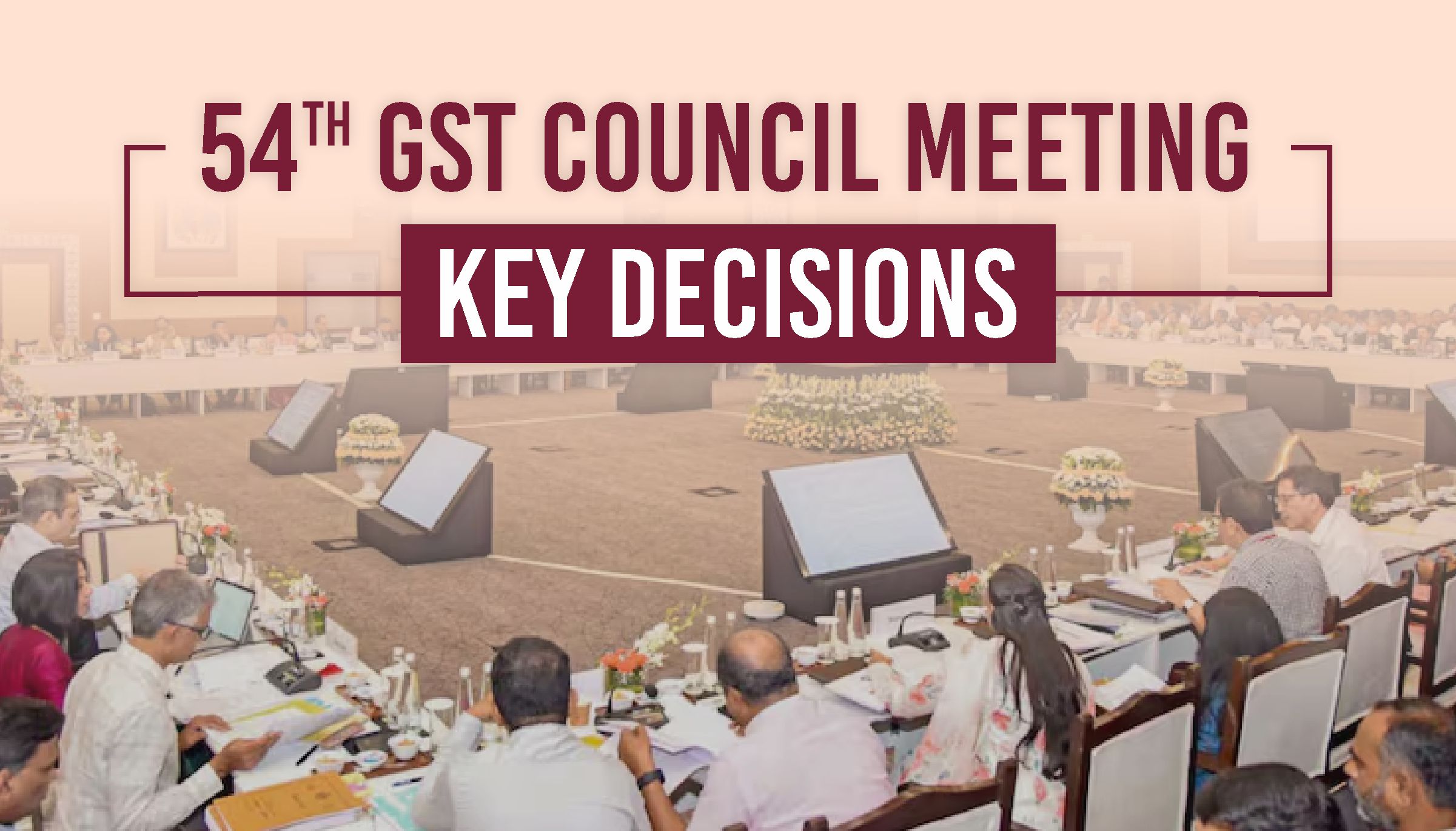54th GST Council Meeting – Key Decisions

The recent GST Council meeting introduced significant changes aimed at streamlining the GST framework and providing relief across various sectors. The meeting covered essential aspects of tax rate modifications, trade facilitation measures, and the streamlining of compliance under the GST regime. Here’s a detailed breakdown of the recommendations made by the Council and their implications for businesses and individuals.
Changes in GST Tax Rates on Goods
1. Namkeens and Extruded/Expanded Savoury Food Products
The GST Council has reduced the GST rate on extruded or expanded savoury products (excluding un-fried or uncooked snack pellets) from 18% to 12%. This brings these products in line with other savoury food items like namkeens and bhujia. Additionally, the Council clarified that the GST rate of 5% on un-fried or uncooked snack pellets remains unchanged.
2. Cancer Drugs
To provide relief for cancer patients, the Council recommended reducing the GST on essential cancer drugs such as Trastuzumab Deruxtecan, Osimertinib, and Durvalumab from 12% to 5%.
3. Metal Scrap
The Council introduced the Reverse Charge Mechanism (RCM) for metal scrap supplied by unregistered persons to registered businesses. Registered buyers must now pay GST under RCM, and suppliers must register when crossing the threshold. Additionally, a TDS rate of 2% will apply for B2B transactions.
4. Roof Mounted Package Unit (RMPU) Air Conditioning Machines for Railways
A clarification was issued regarding the classification of RMPU air conditioning machines used by the railways under HSN 8415, which will attract a GST rate of 28%.
5. Car and Motorcycle Seats
The Council clarified that car seats will now be taxed at a higher rate of 28%, up from 18%, aligning them with the GST rate for motorcycle seats.
GST Tax Rate Changes on Services
1. Life and Health Insurance
A Group of Ministers (GoM) will examine the issues related to GST on life and health insurance. This group comprises representatives from 13 states and is expected to present its report by October 2024.
2. Transport of Passengers by Helicopters
The Council recommended a GST rate of 5% on passenger transport by helicopters on a seat-share basis. Helicopter charters will continue to attract an 18% GST rate.
3. Flying Training Courses
Flying training courses approved by the DGCA and conducted by certified flying training organizations (FTOs) are now exempt from GST, as per the latest clarification.
4. Supply of Research and Development Services
Research and development services provided by government entities, universities, or research associations using government or private grants will be exempt from GST. Past GST demands will be regularized on an ‘as is where is’ basis.
5. Preferential Location Charges (PLC)
The Council clarified that location charges (PLC) related to real estate are part of a composite supply and will follow the same tax treatment as the main supply of construction services.
6. Affiliation Services
Affiliation services provided by universities to their constituent colleges will attract a GST rate of 18%. However, services provided by educational boards like CBSE to government schools will be exempt from GST.
Measures for Facilitation of Trade
1. Waiver of Interest and Penalty for FY 2017-18 to 2019-20
The Council recommended introducing Rule 164 in the CGST Rules, outlining the procedure for availing waivers of interest and penalties for tax demands under Section 73 of the CGST Act. Registered persons have until March 31, 2025, to make payments and avail the benefits.
2. Implementation of Section 16 of CGST Act
The Council recommended issuing a special procedure for rectifying orders under Section 73, 74, 107, or 108 of the CGST Act. This applies to taxpayers who had wrongly availed input tax credit (ITC) but are now eligible due to the changes in Section 16 of the CGST Act.
Amendments to GST Rules for Trade Compliance
1. IGST Refunds for Exports
The Council clarified that IGST refunds on exports where the benefit of concessional or exemption notifications was availed on inputs will be regularized. Additionally, Rule 96(10), Rule 89(4A), and Rule 89(4B) of the CGST Rules will be omitted prospectively to expedite refunds.
2. Issuance of Clarifications
Several circulars will be issued to clarify issues around input tax credit on demo vehicles, the place of supply for advertising services, and data hosting services for foreign cloud computing providers. These clarifications aim to remove ambiguity and reduce legal disputes.
New Initiatives and Technological Enhancements
1. B2C E-Invoicing Pilot
Following the success of e-invoicing in B2B transactions, the Council proposed a pilot for B2C e-invoicing. This initiative is expected to improve business efficiency and transparency, allowing retail customers to verify invoice reporting in GST returns.
2. Invoice Management System and New Ledgers
The Council is introducing an Invoice Management System (IMS) and additional ledgers, including the Reverse Charge Mechanism (RCM) ledger and the Input Tax Credit Reclaim ledger. This will simplify input tax credit management and reduce errors in GST filings.
The GST Council’s latest recommendations mark an important step in simplifying compliance and providing relief across sectors. The changes in tax rates, especially in key goods like cancer drugs and services like life insurance, reflect the Council’s commitment to streamlining the GST regime for both businesses and consumers. The introduction of new technologies such as B2C e-invoicing and the IMS system will further enhance transparency and operational efficiency in the GST framework.
